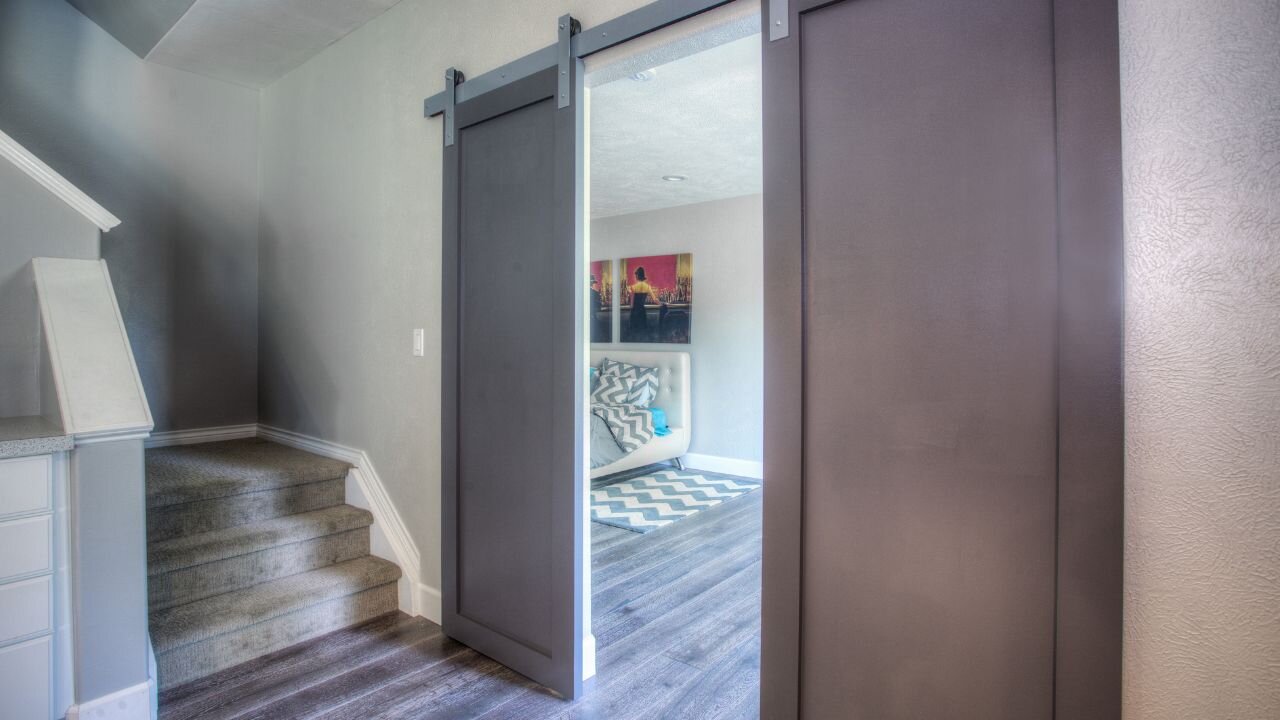Premium Only Content

Is a clean home the key to a successful 2025?
Seven in 10 Americans are pinning the success of 2025 on one thing: a clutter-free home, according to new research.
That's the findings of a new survey of 2,000 adults which explored the connection between the “new year, clean home” mindset.
Results showed Americans place an incredibly strong correlation between starting a new year and the state of their home with 66% saying starting the year clutter-free is 'key.'
While a further 83% say having a clean and organized home sets the tone for the entire year to come.
Surprisingly, 56% admit they’re superstitious about this, believing that starting the year with a clean home means that they’ll have a good year.
Three-quarters of respondents are determined to keep it this way, vowing that they’ll keep their home cleaner than they’ve been able to keep it in years’ past.
The survey conducted by Talker Research for The Container Store found that to start strong, a third of Americans will prioritize going into 2025 with a clutter-free home (34%) — among other goals like sticking to their budget (47%) and starting a new career (16%).
But “new year freshness” only lasts 38 days, estimates those who are planning on cleaning their home; 59% of these respondents said it’ll last even less.
And with winter being the most challenging season to stay organized (35%) and messy habits kicking in about four weeks into the new year, those surveyed have their work cut out to stay tidy.
To get on top of things, most Americans plan to do a big deep clean of their home at the beginning of the new year (61%), averaging that it’ll take them 20 hours to do so.
For many, getting started is the hard part, as the average respondent is more likely to keep a regular cleaning streak after doing so for four weeks in a row.
However, once that streak is broken, half of respondents said it’s hard to get it back (49%).
“The start of a new year is a perfect time for people to begin building habits that will make their lives easier,” said Satish Malhotra, CEO and president of The Container Store. “We know that one of the number one ways to make your day-to-day life easier, save time and even money, is through effective organization and decluttering.”
Those surveyed have different motivations for getting their home in check: three-quarters agree that organizing their home will help them feel like it’s a new home entirely (78%) and a majority also said that a clean home helps them feel more motivated to complete their to-do list (83%).
Messy homes have the opposite effect, leaving Americans feeling overwhelmed (42%), irritable (37%) or unfocused (34%).
The act of decluttering, itself, is satisfying for respondents — even more so than sleeping in on a day off (17%), winning an argument (17%) or finding the perfect parking spot (16%).
To achieve this, three-quarters of those surveyed are planning to get rid of unwanted/unneeded possessions in 2025, letting go of old clothing (66%), papers/notebooks (51%) and decorations (29%).
Those who admit to their home’s clutter level attribute it to their space being too small for the amount of stuff they need (32%) or not being able to decide what to get rid of (31%).
“A clutter-free home and resolution to keep it that way, is important to start the year off on the right note,” said Malhotra. “Keeping these habits starts with understanding the challenges you have in your home and putting organization systems in place that solve them. Multi-purpose organizers can work in any area of the home, and are great solutions to help simplify the process of getting started.”
HOME-RELATED GOALS/RESOLUTIONS FOR 2025
● “Clean my home more.”
● “To be a minimalist. To go through every [room] in the house and throw away what's not needed at all.”
● “Redo my living room. Need to get rid of the extra couch and end tables.”
● “Our home is in need of renovations. We've been putting it off. My goal is to at least get the carpeting out of the kitchen and put down tile.”
● “Cleaning my home and keeping it free of clutter will be a priority.”
● “Become a more organized individual and better living habits.”
● “Downsizing many things we no longer need or use.”
● “To make my home and yard user-friendly.”
● “Clean and organize the garage.”
● “Organize what I have to keep to make it accessible.”
● “Not to over buy.”
● “Try and keep things in their space.”
● “Be on top of my cleaning.”
● “Achieving the redesign of my house.”
● “Declutter my home and not store other people’s stuff.”
● “I want to be able to keep my home organized so that I can feel more productive.”
● “Get things rearranged so it looks less messy.”
● “When I am done using something, put it back right away.”
ORGANIZATIONAL STRATEGIES AMERICANS WILL USE IN 2025
1. Organizing on a regular basis — 43%
2. Only buying things I really need — 38%
3. Getting a better storage system for my belongings — 30%
4. Keep similar objects/belongings together — 24%
5. Keeping flat surfaces organized — 24%
Survey methodology:
Talker Research surveyed 2,000 general population Americans; the survey was commissioned by The Container Store and administered and conducted online by Talker Research between Nov. 15 and Nov. 18, 2024.
We are sourcing from a non-probability frame and the two main sources we use are:
● Traditional online access panels — where respondents opt-in to take part in online market research for an incentive
● Programmatic — where respondents are online and are given the option to take part in a survey to receive a virtual incentive usually related to the online activity they are engaging in
Those who did not fit the specified sample were terminated from the survey. As the survey is fielded, dynamic online sampling is used, adjusting targeting to achieve the quotas specified as part of the sampling plan.
Regardless of which sources a respondent came from, they were directed to an Online Survey, where the survey was conducted in English; a link to the questionnaire can be shared upon request. Respondents were awarded points for completing the survey. These points have a small cash-equivalent monetary value.
Cells are only reported on for analysis if they have a minimum of 80 respondents, and statistical significance is calculated at the 95% level. Data is not weighted, but quotas and other parameters are put in place to reach the desired sample.
Interviews are excluded from the final analysis if they failed quality-checking measures. This includes:
● Speeders: Respondents who complete the survey in a time that is quicker than one-third of the median length of interview are disqualified as speeders
● Open ends: All verbatim responses (full open-ended questions as well as other please specify options) are checked for inappropriate or irrelevant text
● Bots: Captcha is enabled on surveys, which allows the research team to identify and disqualify bots
● Duplicates: Survey software has “deduping” based on digital fingerprinting, which ensures nobody is allowed to take the survey more than once
It is worth noting that this survey was only available to individuals with internet access, and the results may not be generalizable to those without internet access.
-
 0:54
0:54
SWNS
2 days agoDo you need a ‘resolution buddy’ to help keep you on track?
231 -

Viss
4 hours ago🔴LIVE - WINNER WINNER CHICKEN DINNER - PUBG Solo Mayhem!
6.54K1 -
 1:47:58
1:47:58
The Quartering
4 hours agoLA Fires Get WORSE, Sonic 3 Masterpiece, Big Mike Trends As Obama & Trump Get Chummy
66.3K43 -
 1:53:43
1:53:43
vivafrei
6 hours agoCalifornia is Burning Because of DEI & Bad Policy! Trump UIpdates AND MORE! Viva Frei Live
104K152 -
 2:01:50
2:01:50
Jesús Enrique Rosas
5 hours agoEp. 58: Carter's Funeral BODY LANGUAGE, Newsom BURNING, the Lively/Justin Baldoni drama and MOAR!
57.7K45 -
 1:36:36
1:36:36
Mostly Sports With Mark Titus and Brandon Walker
23 hours agoOur Penn State Vs Notre Dame Preview + Jon Gruden Rejoins The Family | Mostly Sports EP 321 | 1.9.25
44.6K -
 56:27
56:27
TheAlecLaceShow
6 hours agoDems Blame Trump For LA Fires | Biden’s Final Disgrace | Guest: Matt Palumbo | The Alec Lace Show
22.6K9 -
 22:37
22:37
Russell Brand
1 day agoElon Musk has had ENOUGH!
102K190 -
 3:49:19
3:49:19
GlizzyPrinceChristian
8 hours agoI Just Split My Gooch This Morning Hehe We Playing Some God Of War Ragnarök
71.8K2 -
 1:57:37
1:57:37
The Charlie Kirk Show
5 hours agoCali Fires: What We Know + The Floyd Case Revisited | Carolla, Collin | 1.9.2025
145K97